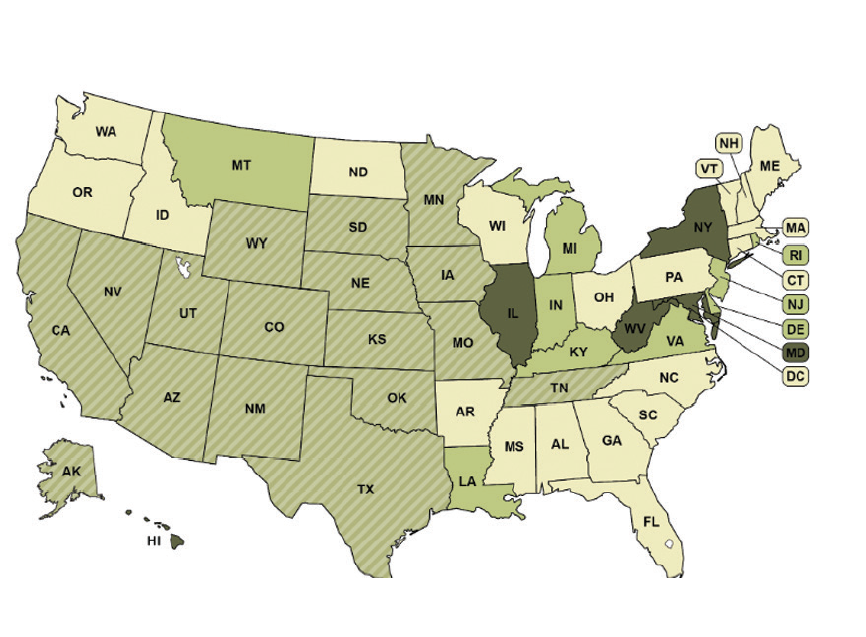Election Day Holidays and Paid Time Off To Vote
A common barrier for voters casting their ballots in-person or returning absentee ballots is getting time away from their jobs. There is no federal law that requires voters be provided time off to cast their ballot, so that policy is left up to the sites. Policymakers have taken two approaches to solve this issue: making Election Day a public holiday or requiring employers to provide paid time off for voting.

![]() States that have Election Day as a public holiday and require employers to provide paid time off to vote. (5 states)
States that have Election Day as a public holiday and require employers to provide paid time off to vote. (5 states)
![]() States that have Election Day as a public holiday but do not require employers o provide paid time off for voting (9 states)
States that have Election Day as a public holiday but do not require employers o provide paid time off for voting (9 states)
![]() States that require employers to provide paid time off for voting but do not have Election Day time off for voting. (17 states)
States that require employers to provide paid time off for voting but do not have Election Day time off for voting. (17 states)
![]() States that do not have Election Day as a public holiday and do not require employers to provide paid time off for voting. (19 states)
States that do not have Election Day as a public holiday and do not require employers to provide paid time off for voting. (19 states)
Voting is not only a right but a responsibility. Your vote, every vote, counts and every vote is your ability to shape decisions that affect you and your community.
So why, with how critically important voting is as not only an act of patriotism but as a symbol of freedom keeping democracy alive, do we not have a voting day set aside as a national holiday?
The people at Democracy Maps, Election Day Holidays and Paid Time Off to Vote (lgbtmap.org) were kind enough to allow the use of their map to show which states afford their workers paid time off to vote. In NYS Election Day is a public holiday and requires employers to provide paid time off for voting. Other states are not as fortunate.
Some states believe having early voting days negates the need to have a paid day off but research has indicated that isn’t the truth. It is possible that early voting results in lower voter turnout, although this thought can be argued both ways. For example, in 2008 American University conducted research that found early voting resulted in lower turnout results in 12 states.
However, it should be noted that in the same year America as a whole experienced the highest turnout we have ever seen in the past 50 years. But, whereas voter turnout may be of debate the thought that early voting creates added to campaign and election costs, increases the possibility of fraud as well as favors incumbents is a real concern. Now instead of one day for voting, there are dozens of days – each day being as important as the other and each daily mass media and campaign worker push by the candidate is just as important as the others. This creates increased costs for the candidates. Unable to keep up with the costs will naturally favor the incumbent who has the ability to utilize the media for free through such avenues as press conferences to promote his or her efforts in office. The increased days for voting also add costs to the polling sites that must remain open for this extended period. And then there is the question of possible fraud or the appearance of fraud. What is done with the marked ballots as they sit for this extended period of time? Is there a possibility they can be lost or damaged or misplaced? Also keeping the polling sites open for a number of days rather than one day is also costly.
So concerning is the idea of early voting that there have been a number of lawsuits including the Ohio State Conference of NAACP v Husted and Ohio Democratic Party v Husted which saw a reduction in the number of days allowed for early voting,
Probably most damaging is having the extra days for voting breaks our country’s unity – our cohesiveness in an expression of democracy and patriotism. Now instead of there being all American voters talking about the “Big Day” it is disjointed with some people voting weeks before.
